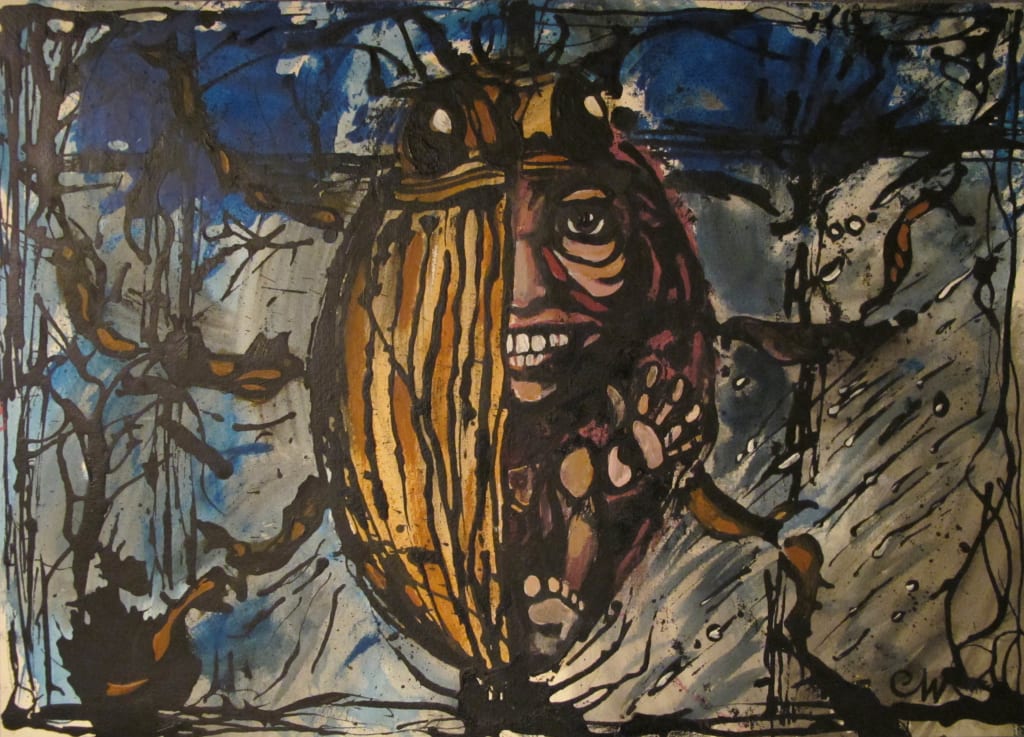Surrendering to the Pain of Guilt and Shame
A look at 'The Metamorphosis' and what it means for us

To give up and to let go can be some of the hardest things to do in life when people are so used to being in control and shouldering responsibilities. Sometimes people are forced to let go, and other times, they give up on their own accord. Sometimes guilt and shame are the reasons to let go and other times, they are the results. In Franz Kafka's novella, The Metamorphosis, characterization, through the depiction of Gregor and his family's transformation; and symbolism, such as, the hospital and the open window in his room are used to explain the guilt and the shame that Gregor felt toward his family, which led to his surrender in the end.
Guilt was one of the main characteristics that Gregor constantly showed throughout the novella. Guilt, defined by Dictionary.com, is "a feeling of responsibility or remorse for some offense... whether real or imagined." Gregor, typically, displayed this emotion whenever his family mentioned money or at the thought of not being able to work due to the state he was in. He felt that it was his responsibility to provide for his family and pay off his father's debts. Not one person in his family helped him by getting a job because, "Though [his] father was indeed still healthy, nevertheless he was an old man who [had not] worked for five years... And as for [his] mother, was she supposed to start bringing in money, burdened as she was by her asthma which made it a strain for her to even walk across the apartment and which kept her gasping for breath every other day on the couch by the open window? Or should his sister go to work instead—she who though seventeen was still a child..." (322). Gregor felt terrible about putting the financial burden on the rest of his family. Feeling so racked with guilt, as time went on, the hospital, which symbolized help and re-vitality, that felt so close and overbearing at the beginning soon became distant and out-of-reach to Gregor at the end.
Though guilt and shame usually go hand-in-hand, they are two vastly different emotions. Shame, defined by Dictionary.com, is "the painful feeling arising from the consciousness of something dishonorable... done by oneself." The difference between shame and guilt, according to Joseph Burgo, is that "the former reflects how we feel about ourselves and the latter involves an awareness that our actions have injured someone else." At the beginning of the story, Gregor would think about his job as a traveling salesman and how he was grateful to develop a habit of locking his door, but after having given his family a scare when they saw him like an insect for the first time, the door was locked and this time, it was not by his choice. The door symbolized a barrier between him and his family. The feeling of keeping his family out of some parts of his life by choice is the complete opposite of the feeling that they no longer want him in their life and that they are fine without him.
Guilt, coupled together with shame, led to Gregor realizing that it was time for him to give in and surrender. Near the end of the story, when the three lodgers found out about Gregor and became very angry at the family, Grete talked about how it was time to get rid of him. She justified this by saying, "how can it be Gregor? If it were, he [would have] realized a long time ago that it's impossible to human beings to live with a creature like that, and he [would have] left of his own accord" (334). Hearing that, Gregor, who has been holding on by a thread, finally decided that it was time to let go. At that time, he was living in a room with a bunch of furniture that no longer belonged in the house nor for which there was any space. It symbolized that he was no different than something that did not belong. Transforming into an insect ironically displayed how human Gregor really was. He felt guilty and shameful that he could no longer take care of his family, and in spite of his situation, he felt joy for them when he learned that his father saved some money and when they had all found work. "On the other hand," Cristina Nicolae states, "the others' change is not a physical one, they do not transform into inhuman creatures, yet they gradually get dehumanized as they give up helping and caring for Gregor, taking refuge in forgetfulness and indifference."
The change that the family went through and the guilt and shame that led to Gregor's death were all exemplified through the characterization of the characters and the symbolisms; such as the door, the hospital, and the furniture; that was so carefully placed throughout the story. To give up and to let go can be some of the hardest things to do, but also, the easiest. They can be some of the bravest things to do, but also, the weakest. For Gregor, giving up and letting go was both very hard and it was also very brave.
About the Creator
Davie Truce
A college student that loves to read and write.






Comments
There are no comments for this story
Be the first to respond and start the conversation.